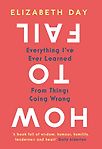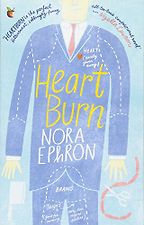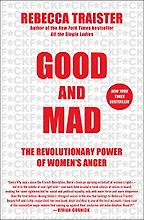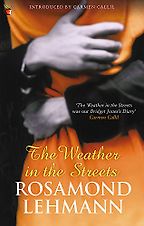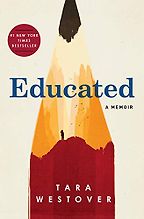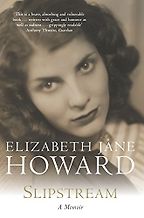Elizabeth, you’re a successful person. You’ve won awards for your journalism, you’ve written bestselling novels, you’ve created a hit podcast. But recently you’ve been focused on failure. Why?
First of all, thank you for the compliment. Because I do consider it a real compliment when someone perceives me as successful. I’m sure that anyone who is in their own skin doesn’t perceive themselves in quite the same way as others do, and that has been a real struggle for me in my life. Not a debilitating one, and there are far worse struggles out there to be endured, but when I was growing up I always had quite low confidence levels. I never had a sense of self-worth and I never felt I fitted in.
I have a very English accent, but when I was four my family moved to Northern Ireland. It was obvious I didn’t fit in because I didn’t speak with a vernacular accent. So I became quite quiet and I listened and I observed more than I joined in at school. I’m very grateful for that now, because I think it made me into a writer. But what it also did was give me drive. Because I had low self-esteem and because I didn’t feel I fitted in, I thought: you know what, I’m going to show these people that I am worth something.
Drive, wherever it comes from, is a useful thing. A tool. Drive made me what you perceive to be objectively successful. Along the way I learned a very good lesson, which was that one can pretend to be confident, and it can become a sort of muscle that you can flex to build up emotional resilience.
Get the weekly Five Books newsletter
One of my first ever jobs in journalism was as a diarist on the London Evening Standard and that required me to walk into parties full of famous people where I knew no one, on my own, and to bowl up to these celebrities to introduce myself and ask them questions that would make an entertaining bit for the next day’s paper. It was completely terrifying. But the more I did it the more I got used to it. And the more I was able to appear confident in those settings.
All of which is a very long way of saying that while I have been really lucky, and fulfilled some of my childhood ambitions to write books, I still have that nagging sense of self-doubt. And for me, that sense of self-doubt comes to a head when something goes wrong in my life.
And the last thing that went properly wrong, which I found truly devastating, was the end of a relationship. In the aftermath of that relationship, which ended in October 2017, I found myself being forced to confront who I really was and what I really wanted out of life. It was at that darkest point that I started thinking about failure. I started thinking about how actually, if I’d looked back at my life a lot of what I’m describing to you, a lot of the biggest learning moments came out of the quote-unquote ‘negative’ stuff.
I began to realise that failure could be an extraordinary catalyst for self-growth. It made me start talking to my female friends in a very open way about this; and it turned out that they just had a similar sort of trajectory. I got to thinking about how wonderful it would be if we could have those sort of open, honest and intimate conversations on a wider scale. So that’s why I’ve been thinking about failure—that was the idea behind my podcast How to Fail With Elizabeth Day, and the subsequent book.
Is there a difference between ‘failure’ and simply ‘not succeeding’? Is it a question of emotional weight?
That’s a really interesting question. Yes, I think there is a difference. Because you can not succeed and feel quite neutral about that. But if you feel that you’ve failed, there’s a personal element that you’re attaching to it.
The more I’ve read into these ideas, the more I’ve realised that there are really interesting things to take from Buddhist and Stoic philosophies, which are about focusing on what you’re dealing with right now. The past no longer exists. The present is all there is. So any failure and rejection that you felt in the past is no longer relevant to your present moment. And there’s an additional, somewhat stoic idea of failure just being a thing—a fact—until you attach emotion to it. Failure just is what it is. You are in control of how you respond to it emotionally.
“I began to realise that failure could be an extraordinary catalyst for self-growth”
Historically, the emotion that we’ve attached to failure is a negative one. I’m a massive proponent of the idea that if we change our mindset, we can look at failure as something that can cause heavy, heavy emotions but is not, in and of itself, necessarily a bad thing. If we skew our perception and change the way we think about it, actually, we can use it to benefit us.
That’s not a catch-all, because there are some horrific and devastating events that happen to people in their lives that are just really . . . shitty. I’m not someone who thinks you get over everything just by flexing your emotional muscle and changing your mindset. Absolutely not.
I just think that we live in an age in curated perfection, where everyone is filtering every single photo they put on Instagram. We’re constantly trying to live up to unrealistic ideals. So I think it would be really nice to have a counterbalance, which is about people accepting that failure is going to happen in their lives, and gaining a better understanding of how to deal with it.
I could definitely benefit from that. Maybe we can talk about your first book choice which is one of my favourite-ever books: Nora Ephron’s Heartburn. What do you love about it?
Well, funnily enough, I’ve only just read it. Which is ludicrous, because I love Nora Ephron’s screenplays. I mean, When Harry Met Sally is a film I could watch until the end of time. It’s the most perfect, perfect screenplay. But because I love Nora Ephron so much, I think I was worried I would be disappointed by the book. So I put off reading it for ages.
What I love about it is what I love about her screenplays: it’s the casually-worn yet acute insight she has into the human condition—particularly the female condition—and the comedy with which she explores serious issues.
It is often described as a ‘thinly-veiled autobiographical novel,’ which draws from the break-up of her relationship with the famous Watergate reporter Carl Bernstein.
She talks about this in the prologue of the new edition, and makes the point that John Updike was forever writing about unhappy marriages not unlike his own. He was never accused of writing a ‘thinly-veiled autobiographical novel.’ This seems to be something firmly laid at the feet of female authors. I thought that was so interesting. I do think that’s true.
“She seems to be writing whatever the fuck she wants to write, and I like that”
There’s still this perception that female authors can’t gaze beyond their own navel. They have to take everything from their own lives. It’s almost as if male critics are accusing them of suffering from a collective lack of imagination. And nothing could be further from the truth. So I like the fact that she tackles that. In writing a novel loosely based on some of her own experiences, she actually plays with the form of the novel in quite a sophisticated way. There isn’t really a conventional plot to it. It’s a just a series of comic interludes and insights, interspersed with recipes. Yet there is something very heart-warming about something that calls itself Heartburn.
I found myself more intrigued than I thought I was going to be because of that. She seems to be writing whatever the fuck she wants to write, and I really like that.
It’s about the failure of a marriage. But by writing a hit book she seems to have turned the failure to her own ends. Is that one of the reasons you picked it out for this list?
Absolutely. Because it’s about a woman claiming her own narrative. Nora Ephron wrote Heartburn in 1983, but I think that that’s still enormously important in the current political climate. Particularly given that the man that Nora Ephron was married to in real life was a journalist, and therefore had control of all sorts of narratives.
In the book, the protagonist talks a lot about her husband—this columnist—stealing stuff that she said for his column. So it’s a literal reacquisition of the narrative she is owed. I do love that, because ultimately it’s what we’ve just been talking about. That in the failure of this particular marriage, this female protagonist is finding her own strength and her own voice. That’s why I love it.
Wonderful, thank you. Your next choice is also reclamation of sorts: Good and Mad by Rebecca Traister, a book that deals with women’s anger. It feels very timely post #MeToo, but why did you want to discuss this in the context of failure?
I am obsessed with this book. I think that Rebecca Traister is phenomenal writer. America has a noble tradition of essayists, and there are shit hot female essayists working in America at the moment. I think of them as the Rebeccas: Rebecca Traister, Rebecca Solnit . . . just brilliant thinkers.
I picked up this book in a bookstore in America when I was flying back to London from LA and I basically read it on the flight back. I couldn’t put it down. The reason I chose it in the context of failure is that she speaks so eloquently about women who have failed to lay stake to their own anger. But her thesis is that it’s a socially conditioned and sanctioned failure. Because the patriarchal society that we’ve been living in for millennia is not well served by women being in touch with their anger—because anger, in Traister’s eyes and in my own eyes, can be an enormous force for change. It can be fuel and it be drive and it can be ambition to change society for the better.
“Anger can be an enormous force for change. It can be fuel to change society for the better”
That’s why I found it such an incredibly invigorating read. And it is very timely. She must have been writing it in real time as the #MeToo movement came about, because she handled it so well. It feels both timely and timeless, and it really, really changed the way I thought about a lot of things.
One of the examples that she uses is that of the civil rights campaign and Rosa Parks, who famously sat in the whites’ section of the bus. Rosa Parks is traditionally seen as this nice, quiet, little lady who was finally pushed to this act of extreme revolution—to sit in a different section of the bus. But actually Rebecca Traister looks at Rosa Parks’ life up that point and finds that she was an agitator. She was an activist. She was extremely angry about inequality. She spoke out about it. She lost her shit. It was so interesting to see it in that context. I had never read that about Rosa Parks before.
I didn’t know that either.
Maybe actually a lot of women are provoked, not by sadness and not by meekness, but this groundswell of anger that they haven’t been able to admit to themselves.
Personally I have often struggled to express my anger in a way that . . . well, to express it at all. Has reading this book changed how you cope with anger?
Definitely. And, to be honest, my life over the last couple of years has really changed how I think about it. It just so happens that this coincided with the #MeToo movement.
There’s a whole chapter in my new book How to Fail: Everything I’ve Learnt from Things Going Wrong that I devoted to anger, which was specifically inspired by all this stuff I’ve been reading around it. I realised, through writing that chapter, that a lot of the time in the past when I felt sad actually I was transmuting anger into something more palatable. Some of the examples I give are: after someone breaks up with you—and this has happened to me—you are sometimes at pains, as the woman, to act like the reasonable one. To not show that you’ve been wounded, to maintain your pride and your dignity and I think that the effect of that is to silence your own rage at something that you perceive to be deeply unjust.
“I realised that a lot of the time when I felt sad actually I was transmuting anger into something more palatable”
In my particular situation it seemed especially unjust, because I was about to turn 39 at the time my ex broke up with me. He was a younger man and he didn’t need to worry about having babies and that was why we broke up—because I needed to start actively doing that if I wanted children and he didn’t feel that he could commit to that. And actually that is a source of not only my personal rage, but also a great deal of rage for women across the ages.
I thought I’d be really sad after that breakup. And I was. But the sadness masked a fury that I now acknowledge, and the interesting thing about acknowledging that fury was that I felt so much calmer as a result. I was no longer trying to be someone different. I was acknowledging that part of me and that’s been a really interesting process.
But like you, in the past, I’ve found it difficult. I spent a lot of time being a people-pleaser in my past. You can’t be angry and also a people-pleaser, because you want people like you. But it’s funny because, historically, when I’ve gotten behind the wheel of a car I would get proper road rage. I would unleash the foulest expletives against people who cut into me in traffic jams. I think that was one of the only socially sanctioned ways that my anger could get out. I’m much more in touch with it now, thankfully.
Interesting. I wonder if the discussion of your break-up brings us to our third title: The Weather in the Streets by Rosamond Lehmann. This classic novel was first published in 1936. It also deals with the failure of a marriage, but earlier you said that you’ve included it because it deals with the failure to have a child. Could you say more about that?
Of course. This is one of my favourite novels of all time, actually. I think Rosamond Lehmann is criminally under-acclaimed. As you say, it was written in 1936, but it feels like such a modern novel because the protagonist, Olivia is dealing with so many modern dilemmas. I read it in my early- to mid-thirties, when I was married and undergoing IVF. The IVF was unsuccessful. Then I got pregnant naturally, and then I had a miscarriage at three months. This all happened in the space in one year.
The Weather in the Streets deals not only with the ethics of being ‘the other woman,’ which is what Olivia is—she’s having an affair with a married man, so she’s partly responsible for the failure of a marriage, which you only see off-screen—but also deals with getting pregnant and having an abortion. It was one of the first ever novels to include a very viscerally conveyed abortion scene. It’s a back-street abortion scene, and it is so incredibly well-written in a powerful and understated way.
Five Books interviews are expensive to produce. If you're enjoying this interview, please support us by donating a small amount.
Olivia, the protagonist, is so interesting because of the way Rosamond Lehmann writes: she’ll sometimes switch from third person to first person within the space of paragraphs. So you have this feeling of being both inside Olivia’s head and outside observing it. And then, after the abortion, you have the feeling to the extreme degree she’s had this experience that’s deeply emotional but is also observing it happened to her.
That’s is exactly how I felt when I went through my miscarriage. It was a period of kind of numbness and automated behaviour, and I was observing myself going through it thinking, ‘I’m handling this really well.’ It was only about a month later that I realised that I hadn’t really handled it and my marriage ended. The Weather in the Streets was a very important book for me at that specific time.
When people are going through a difficult time, I find that they tend have a strong response one way or the other: either they find solace in books that deal with similar themes, or they avoid reading anything even tangentially related to what they’re going through. Bibliotherapy versus escapism. I take it that literature has helped you come to terms with distressing events in your life?
It really, really has. It’s interesting because there are lots of authors who don’t like to read other books while their writing their own. I’ve never understood that, because I need constantly to be reading something, constantly to be engaged, and to feel understood on the page, and inspired, and all of those things. So yes, fiction has hugely, hugely helped me.
Curtis Sittenfeld is actually quite an important author to me. She’s terrific. She wrote a book call Prep which is all about not fitting in at school. I read it years after I left school, but it was very helpful in some ways to allow those themes to percolate. I’m just looking at my bookshelf now, and I’m just thinking that there are a lot of tricky heterosexual relationships in a lot of my books. But I read Rosamond Lehmann at a specific time of my life, when my marriage was breaking down.
There’s also Elena Ferrante and her Neapolitan Quartet. Oh my god! I read that as my marriage was breaking down; I went to LA for two months to restore myself and read the Elena Ferrante books at that time. I found them so invigorating, because it’s entirely about female friendship, which at the time didn’t get that much airplay. And it was entirely about the female experience, and what women go through, and how fucking strong they are. And again about reclaiming that narrative and giving it the space for four books. I found it really helped at a time when I needed that kind of strength. So I definitely find myself in the pages of fiction.
Actually, as an addendum to that: when I lived in Northern Ireland, I never wanted to read novels set in Northern Ireland, because it was just too close to home. There was a lot going on when I was living there—we moved there in 1982, and the Good Friday Agreement wasn’t signed until 1998. I saw a lot of bombs, was very aware of the political tension. On the way to school every morning I would get stopped by military checkpoints, all that sort of stuff. So I didn’t want to read novels set about the Troubles.
But I just recently felt a real thirst to discover more about the history that I lived through. I recently read an amazing nonfiction book called Say Nothing by Patrick Radden Keefe which is all about that period of history. So I think sometimes it just takes a while to process it, and then I’m ready to read the books associated with that time.
Absolutely. Maybe we could move onto a work of memoir: Tara Westover’s Educated. This popped up on Five Books recently as a book shortlisted by the National Book Critic’s Circle. You wanted to discuss the failure of memory at the heart of this book.
This is one of the best books that I’ve read in the last decade. Quite apart from the extraordinary story of her life, it is so beautifully written. So powerfully written. I read this book when it was first published, was blown away by it, and emailed her publishers to say ‘I’d like to do anything to help. Can I have Tara on my podcast?’ So I had the great fortune of talking to her about her own memoir.
What I’d taken from the memoir was that it was about how you can remove yourself from your environment and, if you have the thirst and the curiosity to ask the right questions of yourself and your environment, you can educate yourself in so many different ways. But what she said to me was that, for her, it was very much about memory and fallibility of memory.
“This is one of the best books that I’ve read in the last decade”
When she was growing up, as is the case in most families, her parents were in charge of the dominant narrative because they were the grown-ups. So she never questioned the fact that her father thought the end of days was coming and they shouldn’t ever go to the hospital and that Ibuprofen was the work of the devil. That was just what she was taught, and it was only as she came into her teenage years and her older brother was being flippantly abusive towards her that she started to question the rightness of that. When she questioned it openly with her family they shut her down. That was when she realised, years later, when she came to write this memoir, that’s when her own memory had been playing tricks on her. Her own memory had rewritten the past to make it acceptable.
I just thought that was a really fascinating aspect, not just of Tara’s story, but the wider historical narrative of the world. Because things are often only written in retrospect and memory is fallible. And the things that are written are often only written by a.) men, and b.) triumphant men. It just throws into question what we’re being taught about our collective past.
In the end Tara does succeed—she studies at both Harvard and Cambridge. But she describes some notable failures from along the way. On your podcast she discussed flunking her very first exam and how much that rattled her—and it does make you see that resilience can be difficult to develop.
Absolutely. For Tara, her self-identity was so wrapped up in having made the enormous decision to distance herself from her family. To choose a different path and to be academic. That first test represented so much more than just an academic failure. It represented, to her at the time, a failure of self. And I think a lot of people who strive to do well at school, as I did, are rewarded for doing well in school by their teachers and praised for it.
That then becomes a sort of cycle where you think if I put the work in and get the result, life’s going to be peachy. And then when you fail the test it feels like real devastation. And secondly, when you leave school and you go into the real world, you realise there aren’t all these handy tests to tell you how you’re doing and that in itself can be discombobulating and difficult for high achievers at school.
A test at school is never just a test. If you can treat it as ‘just a test’ then you are a highly evolved human being.
Finally, you’ve chosen another work of autobiography, Slipstream by Elizabeth Jane Howard. Please tell me about this book.
Elizabeth Jane Howard is one of my all-time favourite authors. Again, I think she was overlooked in her lifetime because she had the misfortune to be married to Kingsley Amis, who was much more famous at the time. She was also Martin Amis’ stepmother and he credits her with his love for literature.
Howard is most famous for writing a loosely autobiographical set of novels called The Cazalet Chronicles, about a family during World War II and then post-war Sussex. It’s such a beautiful collection; she handled this wonderful cast of characters with great beauty and aplomb and insight.
When I came to write my first novel I actually re-read Elizabeth Jane Howard to see how she did it. And again, a bit like Lehmann, it the space of one paragraph she shifts the perspective from one character to another, and it’s so seamlessly done that as a reader you don’t even notice that it’s happening. Anyway, she’s a wonderful writer.
“Success is not a stretch limousine. Success is in knowing yourself, and loving each other, and feeling content with life”
Slipstream is her memoir. I read the Cazalet Chronicles and then I read Slipstream, and it was fascinating to me how much she had drawn from her own life. One of the things I hadn’t realised is that there is a storyline in the Cazalets about a father who acts extremely inappropriately towards his daughter. In modern day parlance it would be abuse. But the way Howard handles it is very delicate—she says that the daughter felt that this was an extreme example of physical affection—and that was lifted from Elizabeth Jane Howard’s own life. Her father did it to her and Slipstream recounts that.
What that episode left her with was an innate need for the approval of men and a consequent failure to find herself lovable. And she ended up having a string of disastrous affairs with various high profile men include Laurie Lee and Cecil Day-Lewis and then eventually Kingsley Amis.
She never fully believed in herself. She was a wonderful homemaker. She would make every home that she lived in beautiful. She would do incredible meals and she was a conscientious stepmother. And I think that was all part of her trying to shore up her lack of self-esteem.
Get the weekly Five Books newsletter
I think that is a great sadness because she is a brilliant novelist and I’m not sure if she ever realised that about herself. I actually met Elizabeth Jane Howard a couple of times before she died. When I wrote my first novel I sent it to her it and she was kind enough to write me a blurb. Before we met, we had a short exchange of letters and I said to her: ‘it means so much to me coming from you, because I so admire you, and you’ve taught me so much through your books.’ She replied to say, ‘That’s so nice to hear because I feel as if everything I write ends up in a great lake of silence.’
It made me so sad to hear that. It was also meant to be reassuring—as often one feels that way as a novelist. Much later, I interviewed her, and we had lunch after that and I got to know her a bit. She was so wonderful, but still didn’t believe that she was worth much even though at that time she was undergoing a critical re-evaluation and they were dramatising the Cazelet Chronicles for Radio 4. And I’m glad to say she did get a level of success just before she died. That was very important for her, and Slipstream is a phenomenal work of autobiography because it’s so extraordinarily honest. She is not afraid of painting an unflattering picture of herself, and she has incredible insight into her own behaviour. It’s a wonderful book.
Well, thank you. This wasn’t a book I’d come across before, I’m immediately going to run out and get a copy.
You’ll love it.
Let me finish by returning how you begin each of your podcasts: “learning how to fail is actually learning how to succeed better.” Have you found it freeing to be so open about failures of your own—and those of others?
I find it so freeing. I’ve actually found it a source of tremendous solidarity, as so many people have got in touch with me saying that the podcast has made them feel less alone. Or it has gotten through a particularly tricky time in their life. Or it has made them feel understood. That’s such a beautiful thing, because the reason I write—the reason I do anything I do—is to connect. And feeling that connection and understanding that there is a thirst for that level of connection has been a really beautiful discovery.
“The reason I write—the reason I do anything I do—is to connect”
I’m completely aware of the irony that a project about failure has turned out to be the most successful thing I’ve done so far. But that, in itself, is a kind of neat way of putting across exactly that sentiment: that by learning how to fail I am actually learning how to succeed. Because I’ve been learning to be open and honest, and to share. Because I’ve been learning that in doing so you actually end up connecting, and being more human, and that for me is what success looks like.
Success is not a wad of dollar bills. Success is not a stretch limousine. Success is in knowing yourself, and loving each other, and feeling content with life. And having faith during the patches when you’re not feeling content—when you’re going through something rough—that contentment will come again.
Interview by Cal Flyn, Deputy Editor
April 5, 2019. Updated: September 22, 2023
Five Books aims to keep its book recommendations and interviews up to date. If you are the interviewee and would like to update your choice of books (or even just what you say about them) please email us at [email protected]

